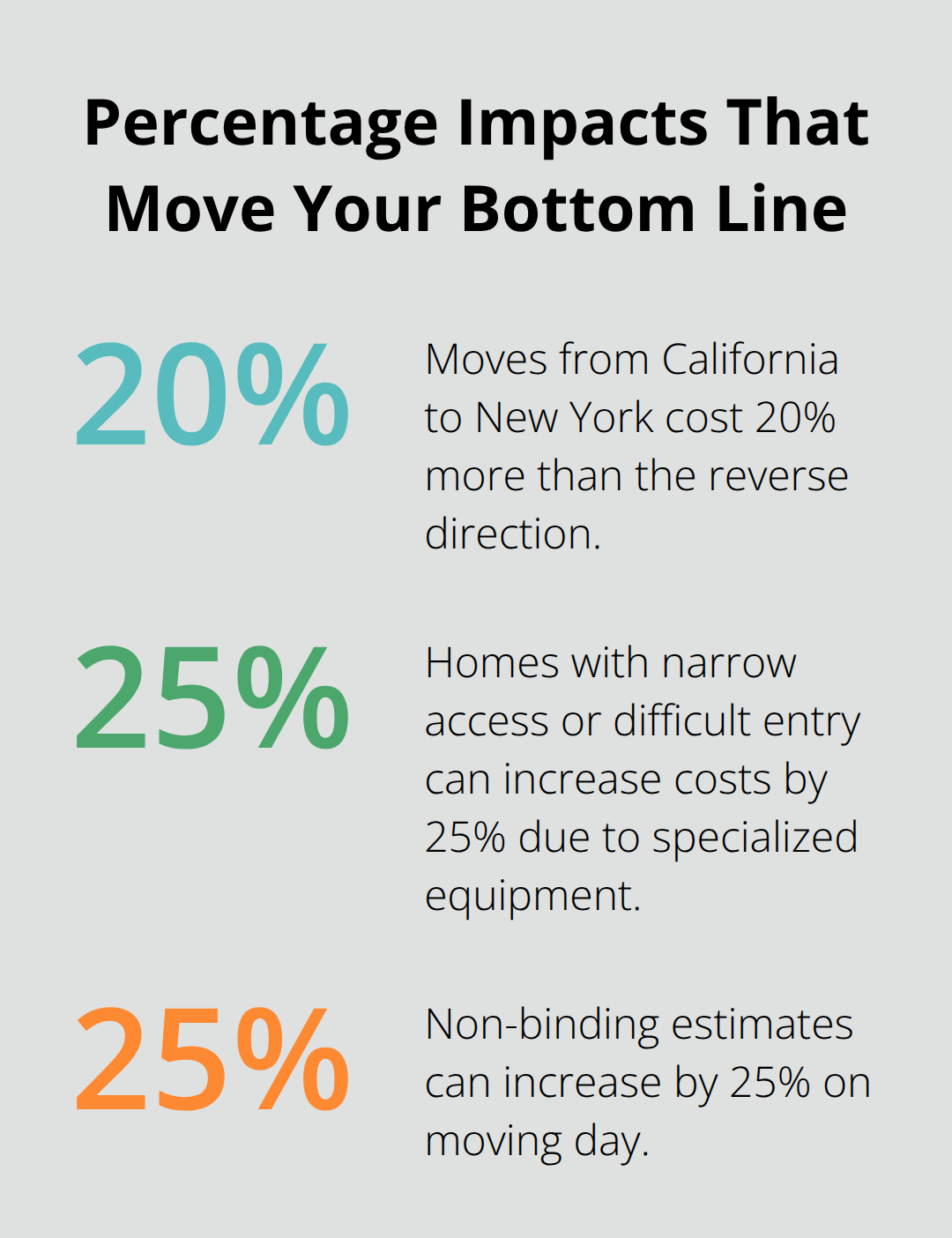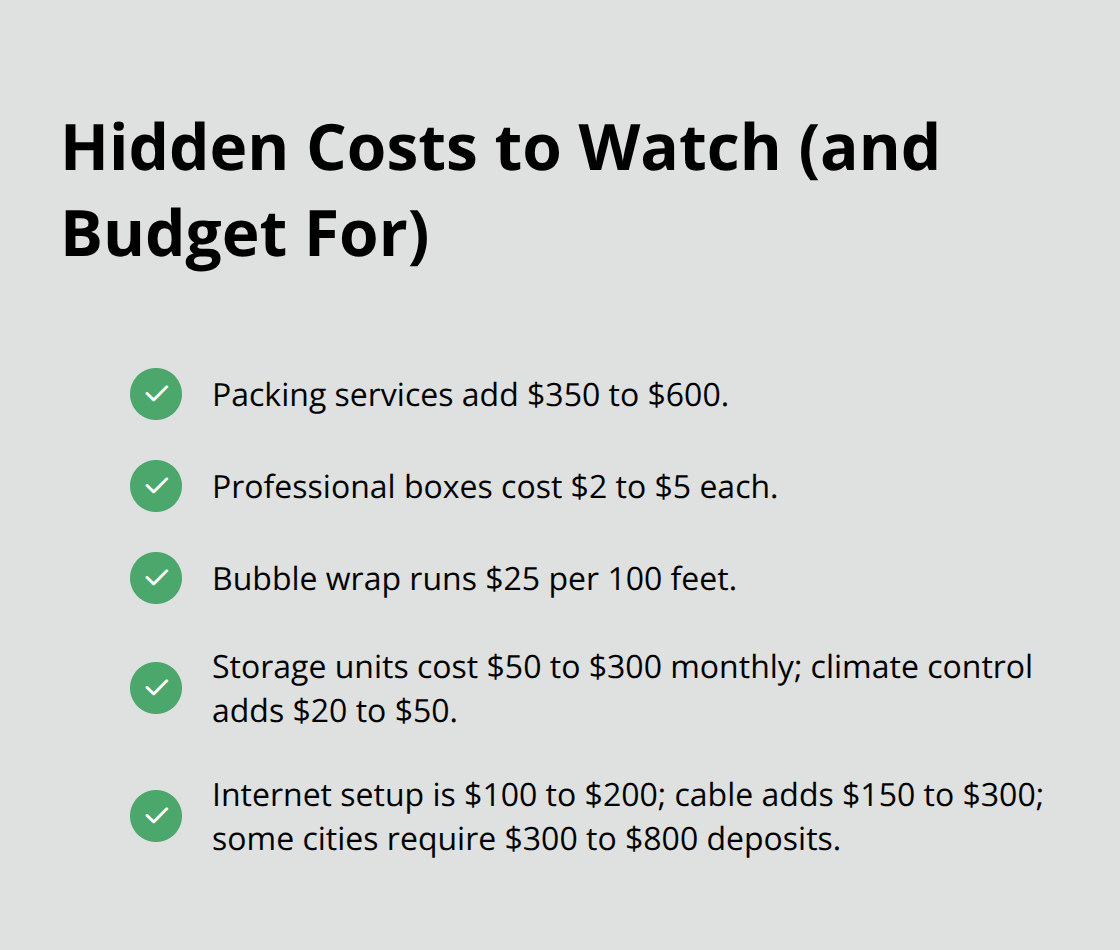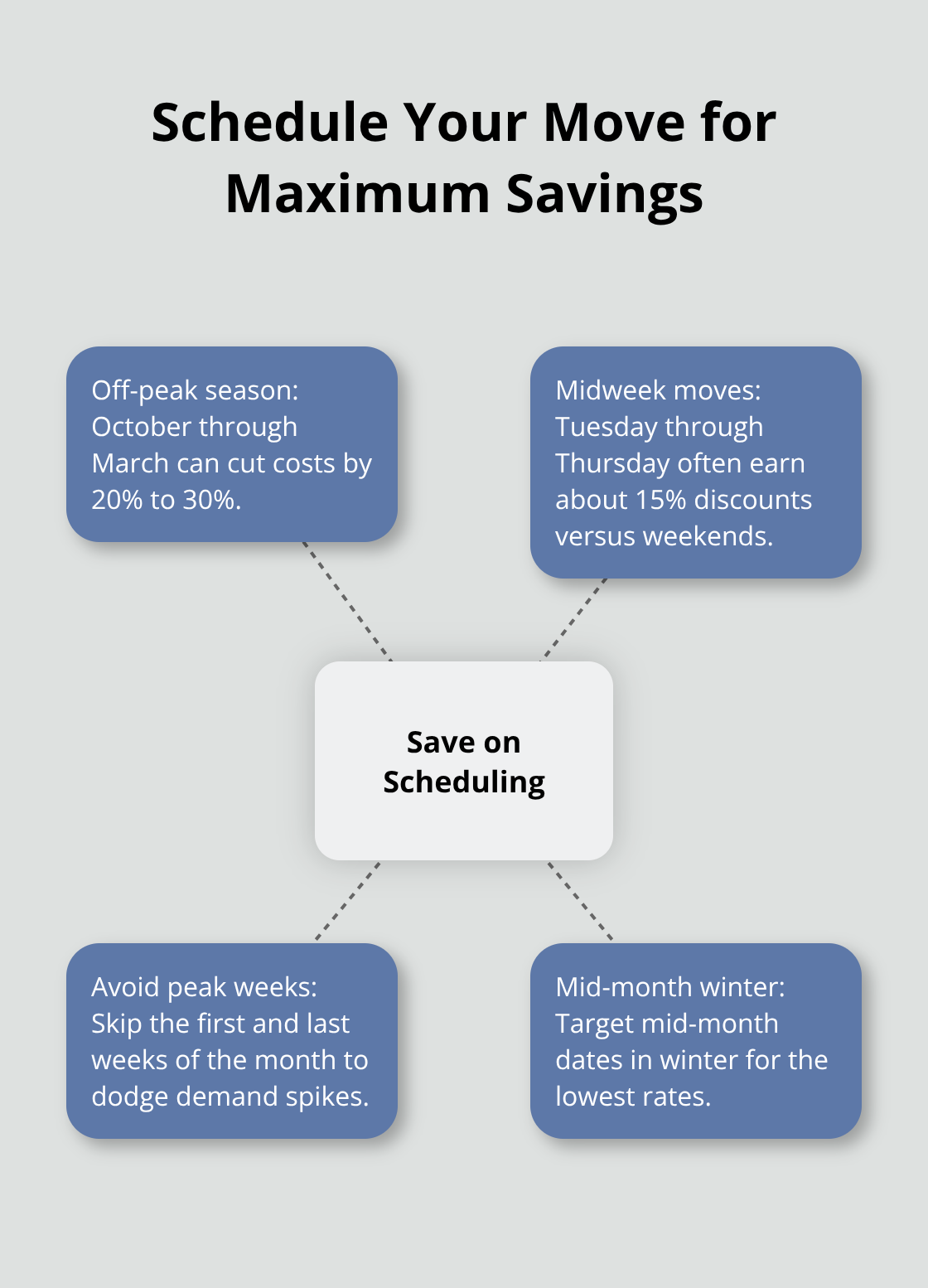Moving house costs can quickly spiral beyond your initial budget if you’re not prepared. The average American household spends between $2,500 and $5,000 on a local move, but hidden expenses often double that amount.
We at Southbay Moving Systems see families shocked by unexpected fees they never planned for. This guide breaks down every expense you’ll face and shows you how to avoid costly surprises.
Average Moving Costs by Distance and Home Size
Local Move Expenses Break Down Simply
Local moves within the same city cost between $800 and $2,500 according to the American Moving and Storage Association. Companies charge hourly rates from $65 to $251 per hour for two movers and a truck. Time drives the biggest cost increases – moves that exceed four hours see dramatic price jumps. Weight creates more impact than most people expect: a studio apartment averages 1,800 pounds while a four-bedroom house reaches 9,000 pounds. Distance within your local area also affects pricing, with moves over 50 miles often switching to long-distance rates that can double your bill.
Long-Distance Moves Follow Different Rules
Cross-country relocations use completely different pricing models, with costs ranging from $2,000 to $6,000 based on weight and mileage. Companies charge approximately $1.50 per pound for distances over 1,000 miles (making a 7,000-pound household cost around $10,500 just for transport). Route complexity adds another expense layer – moves from California to New York cost 20% more than the reverse direction due to demand patterns. Fuel surcharges add $300 to $800 to your final bill depending on current gas prices.

Home Size Creates the Biggest Cost Shocks
Square footage directly correlates to costs at roughly $12 to $16 per square foot for local moves. A 1,000-square-foot apartment costs $12,000 to $16,000 to relocate, while a 2,500-square-foot home jumps to $30,000 to $40,000. The number of rooms matters less than total cubic feet of belongings – a cluttered two-bedroom often costs more than a minimalist four-bedroom. Stairs add $50 to $100 per flight, and homes with narrow doorways or difficult access can increase costs by 25% due to specialized equipment needs.
These base costs represent just the foundation of your total expenses. Many families discover that additional fees and overlooked expenses can push their final bill significantly higher than these initial estimates suggest.
Hidden Moving Expenses Most People Overlook
Packing Materials Cost More Than Expected
Packing services cost an additional $350 to $600 for packing and unpacking, depending on how many belongings you have. Professional-grade boxes run $2 to $5 each, bubble wrap costs $25 per 100 feet, and packing tape adds another $30 to $50. A typical three-bedroom home needs 60 to 80 boxes plus specialty containers for dishes, mirrors, and artwork.
Specialty packing materials drive costs higher. Wardrobe boxes cost $15 to $20 each, while dish packs run $8 to $12. Mirror boxes and picture frames require custom sizing that adds $25 to $50 per item. Many families discover they need twice as many supplies as initially estimated.

Storage and Temporary Housing Drain Budgets
Storage fees catch families off guard when closing dates don’t align. Units cost $50 to $300 monthly depending on size and location. Climate-controlled storage adds another $20 to $50 monthly but protects valuable items from damage.
Temporary housing expenses average $1,000 weekly for hotel stays or short-term rentals when moves stretch longer than expected. Extended stays force families into corporate housing that costs $2,000 to $4,000 monthly (significantly more than standard apartment rentals).
Utility Setup Fees Hit Hard
Utility companies require service deposits, with electric and gas requiring the highest amounts based on credit scores. Internet installation costs $100 to $200 plus activation fees, while cable setup adds another $150 to $300.
Water and sewer deposits vary dramatically by municipality. Some cities charge nothing while others demand $300 to $800 upfront. Trash collection setup fees range from $25 to $75, and many areas require annual payments in advance.
Connection timing creates additional expenses when utilities can’t activate on move-in day, forcing families into extended hotel stays that cost $150 to $400 nightly. Smart planning and early coordination can prevent these costly delays, but many families learn this lesson too late.
Money-Saving Strategies for Your Move
Smart preparation reduces your moving expenses, though specific savings percentages vary by situation and planning approach. Pack everything yourself with free boxes from liquor stores, grocery stores, and online marketplaces – this saves $350 to $600 compared to professional packing services. Use towels, blankets, and clothing as padding instead of purchasing bubble wrap at $25 per 100 feet. Newspaper works perfectly for dish protection and costs nothing. Start box collection six weeks before your move and try for 10 boxes per room as your baseline estimate.
Schedule Your Move for Maximum Savings
October through March moves cut costs by 20% to 30% compared to peak summer months when demand drives prices higher. Tuesday through Thursday moves cost significantly less than weekends – some companies offer 15% discounts for midweek bookings. Avoid the first and last weeks of any month when rental leases typically expire and demand spikes.

Mid-month moves during winter months represent the sweet spot for lowest prices.
Master the Quote Comparison Process
Get quotes from at least five companies and never accept the first estimate. Companies often match competitor prices when you present lower offers – families regularly see savings of $200 to $800 through simple negotiation. Ask each company to itemize every fee (fuel surcharges, stair fees, and packing material costs included). Binding estimates protect you from surprise charges while non-binding estimates can increase by 25% on moving day.
Verify Company Credentials
Check each company’s license through the Federal Motor Carrier Safety Administration database to avoid scams that cost families thousands in lost belongings and fraudulent charges. Read reviews on multiple platforms and verify insurance coverage before signing contracts. Companies with proper licensing and positive customer feedback deliver better service and fewer surprise fees (making your investment worthwhile).
Final Thoughts
House moves cost between $800 and $6,000 depending on distance and size, but hidden expenses often double these base amounts. Packing materials, storage fees, and utility deposits add thousands to your final bill. Smart families budget an extra 20% beyond initial quotes to handle these surprise costs.
Early preparation cuts expenses significantly when you collect free boxes six weeks ahead and schedule moves during off-peak months. Companies charge 20% to 30% less during winter months compared to summer demand periods. Quote comparison from five different movers saves hundreds through competitive pricing (and helps you avoid overpriced services).
Professional movers deliver transparent pricing without surprise charges that plague many moves. We at Southbay Moving Systems provide detailed estimates and handle every aspect of your relocation with experienced crews. Our licensed team protects your budget from the unexpected costs when moving house that catch most families off guard.




